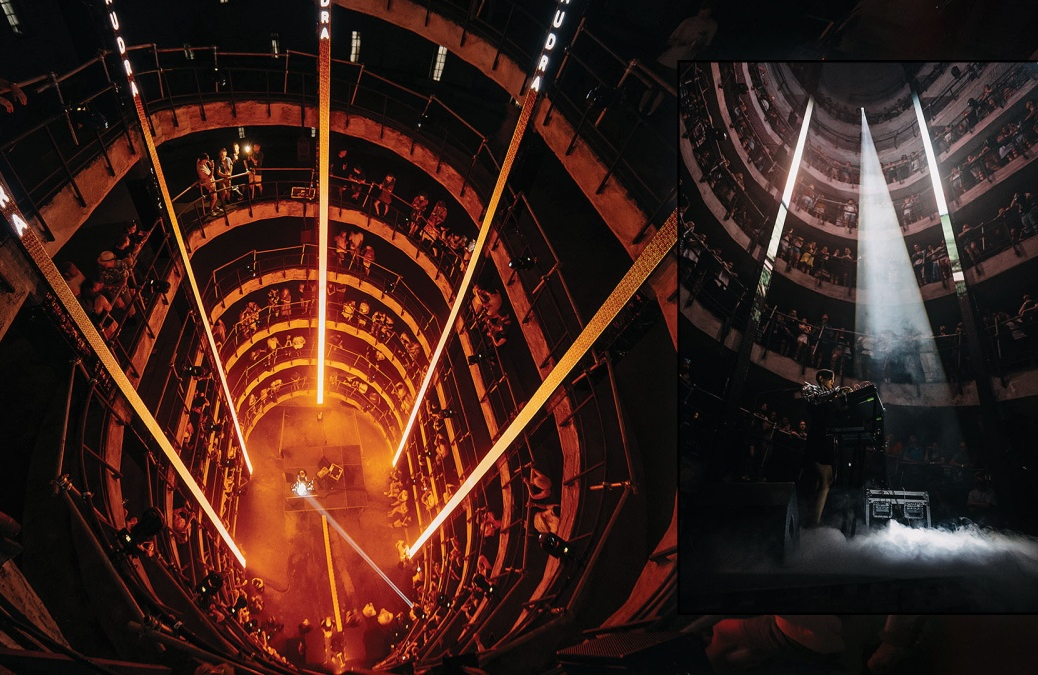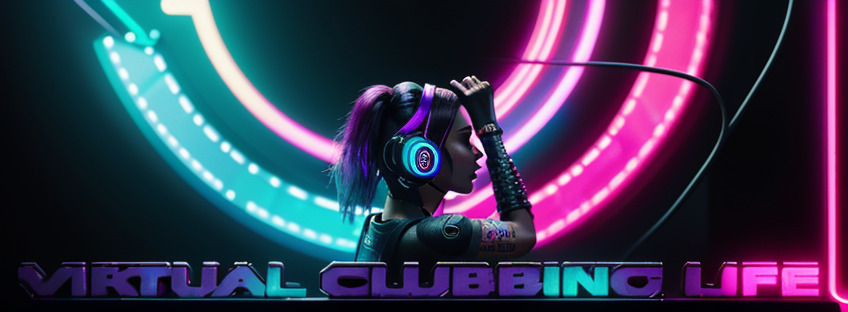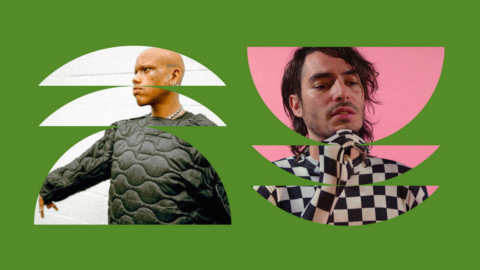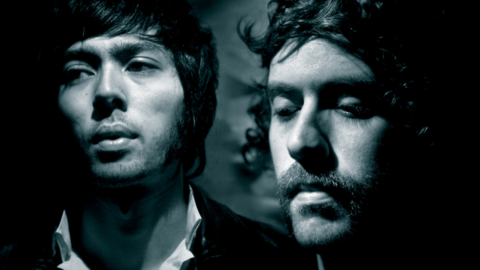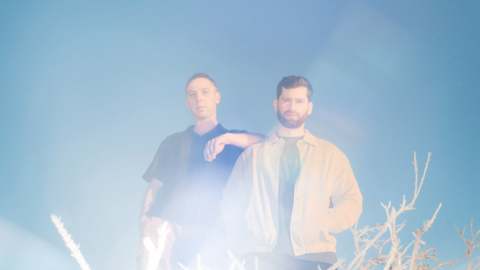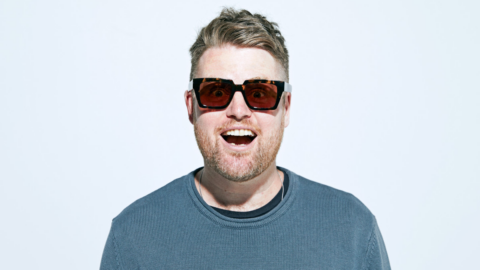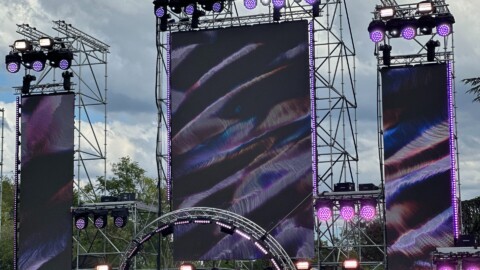From AUDRA festival in Kaunas, Lithuania, Martin Guttridge-Hewitt reports on a long-standing, tight-knit and thriving electronic music scene often overlooked by outsiders
Pergalė is a sprawling industrial complex in a forgotten corner of central Kaunas, Lithuania’s modest-sized second city. A gated entrance obscures interior yards from view, only a long, whitewashed building with a church-like spired roof remaining visible from the road. But when DJ Mag arrives at 11PM one Friday in July, it’s clear something special is happening inside.
Tonight and tomorrow the address is the focal point of Contemporary City Festival AUDRA’s after-dark music programme. Translated into English as ‘Storm’, this is AUDRA’s inaugural edition and forms a key part of various contemporary arts celebrations linked to Kaunas being named European Capital of Culture 2022. Our first glimpse inside sets the tone: an outdoor area of seating and a bar, a scaffolded staircase and overhead walkway connecting two neighbouring buildings with a third, and smiling faces brimming with enthusiasm in every direction.
It’s in that third structure that we find the smallest room for music, which, if it were a standalone club, would be up there with the best we’ve seen in some time. Perched on the top floor, the journey up from ground level takes us through a dimly lit surrealist warren, side spaces opening out around different corners. One is covered in sand and cast in intense UV, giving a whole new context to the phrase ‘sunglasses at night’. Another packs shelves of plants and greenery, an au natural contrast to the wrought and corrugated materials dominating the overall aesthetic.
The dancefloor is a basic rectangle, one wall lined with windows looking out and below, black curtains hastily draped to maximise darkness, while red and blue light refracts through floor-to-ceiling glass tiles on the opposite side. These intimate surrounds offer some of the biggest musical highlights, not least Lithuania’s own Patricia Kokett, who steps up and then some when Deena Abdelwahed’s live show is called off due to flight issues. The mutant rave rhythms and ethereal, spiritual tones we are given effortlessly marry depth with fun.
Mor Elian doesn’t let a last-minute change of time slot put her off, either, dishing out broken, thick electro sounds. Aurora Halal’s heavy, detailed and hypnotic techno feels just as perfect blasting from the same booth. The space is warmed up nicely for Dutch juggernaut Identified Patient and homegrown legend Manfredas, whose back-to-back exceeds four hours. Cycling between psychedelic sludge and tough, bouncy rollers, the sense of forward drive sticks to us, making it impossible to escape. Finally bringing things to a close in the late morning due to an impending airport transfer, Identified Patient continues solo with a succession of obscure one-more-tunes that speak volumes about how much the AUDRA crowd want to be challenged as much as satisfied.
Elsewhere on-site, Room Two feels plucked straight from archive footage of early acid house raves. A warehouse in the truest sense, Job Jobse captures a mood during the last throes of Friday. Sunlight piercing through rusted ceiling windows, to our left on a raised platform a group encapsulates the scene: four shirtless dancers are grinning ear-to-ear, hands in the air, while another, clad in sunglasses, seems to command them all via stomps and finger-points. Tasteful, trancey house pounds from the impressive rig; Humate’s ecstasy-tinged ‘Love Stimulation’ and the reflective Olive anthem, ‘You’re Not Alone’, ring out.
The following evening, globe-trotting tones lead the charge. Arp Frique & Family meld classic New York City disco with Cape Verdean and Caribbean dance. Members of the ensemble hail from multiple time zones and cultures, and their captivating performance threads these seemingly disparate styles together perfectly. A typically supercharged two hours from Antal follow, threatening to transport the packed and messy floor to NYC, circa 1985, with selections straight from the rare crates.
At AUDRA’s heart stands a crew that has been central to the local party scene for decades. Their legendary Prisukamas Abrikosas raves, also held at this site, have grown from humble beginnings into an irregular institution that has now run for 17 years. The team also opened their own nightclub in Kaunas — Lizdas — around 2015, which has risen to become one of Lithuania’s most respected. “Everyone is just into it, and that’s the difference,” says Monika Balčiauskaitė — one of the core crew behind AUDRA and Lizdas — of promoters and punters in Lithuania. Having met us at the courtyard bar, she’s eager to lead us through a gargantuan space within Pergalė, packed with machinery and piles of scrap metal. Proudly, she makes sure we understand that come Monday morning these production lines will be functioning again, despite ghd scores of revellers currently wandering about. “It’s a working factory,” she says. We explain this might be the only time we’ve partied in a functioning workshop. “There’s a first time for everything,” she replies.
AUDRA’s main room will also be handed back to factory staff after the weekend. Big without being overwhelming, a huge circular lighting rigs hang overhead inside; dancers climb up rear speak stacks, and — despite more travel upsets preventing The Hacker from landing — Kittin delivers one of the weekend’s finest sets, spinning sleazy into slamming while unleashing pure suggestion on the microphone.
“Lithuania has a very established electronic culture. Vilnius has the attention, but Kaunas, even going back to when we started partying at 14, there were big, quality raves.” – Matas Bernotas
Later, one of Lizdas’ central DJs, Alex Krell, warms up for a stream of techno DJs known to cause nosebleeds, keeping things on a knife-edge with muscular machine music — fidget-y half-step, industrial elements, intelligent arrangements and perfect blends abound. Also resident at Kablys, a key techno haunt in the Lithuanian capital, Vilnius, he tells us the country has been having a moment for years.
“If you can find parties in Tbilisi, Georgia, you can find just as good here,” he says. “We have really amazing locals who are just fucking good diggers,” says Krell. He doesn’t think the rest of Europe, and countries beyond, give Lithuania the recognition it deserves as a stronghold of electronic music. “I had a release with [fellow Lithuanian producer] Gardens of God, it was played on BBC Radio 1, sold out on vinyl, and I got no bookings from it really. My main goal isn’t to be famous, but when you play 12 years in Kaunas and Vilnius, you know your clubs, what dancers need, and want to go bigger, share your music with other people. It’s not about money, it’s about inner joy. I guess most local DJs here would say the same.
“Lizdas has grown its own generation. So what you see here, at the festival, has been built from the ground up. I remember when they opened… In the beginning it was pretty much empty. Then after around one year, it exploded,” he continues. “I just don’t know why more people don’t come. If you want to book an A-class artist, they often don’t take the booking. There is a huge difference when they can take the date here at Lizdas for €1,000 or one for €5,000 at a big Berlin venue. They don’t take Lithuania too seriously, but then most people who play here leave saying this is the best audience.”
It’s easy to see what he means. There’s an overwhelming sense that, while this is Year One of a brand new festival in a country overlooked by artists, agents, and techno tourists, Lithuania’s scene is mature and its punters experienced; it’s a country that’s been doing things on its own terms for decades. Speaking to people outside, or lining up at the bar for a drink, their passion is tangible and knowledge of tunes frequently intimidating. Most importantly though, their outgoing inclusivity is immediate.
AUDRA’s daytime and evening programme mirrors that attitude. Away from Pergalė, the full festival spans a week from late June to early July. Within those dates, more than 40 free-to-attend installations, dance performances, gigs, exhibitions, panels and more are spread across a very walkable distance. A QR code system offers rewards the more venues you visit, encouraging exploration. Despite the specialist nature of the main course, then, these side dishes are about inviting the entire city to play.
Among the most impressive of the activities is an audiovisual spectacular based at the appropriately named Taxi Park — a decrepit multi-storey that once housed out-of-service cabs. It now hosts an immersive 15-minute sensory experience based around light beams and ambient-industrial sounds. It’s nothing short of world class. Sadly, flight times mean we miss a one-off performance by electronic music composer and visionary Caterina Barbieri at this address — AUDRA’s grand opening — but countless attendees eagerly explain how she made the most of the unique space, its lasers and incredible acoustics.
Elsewhere, another car park — this time still in public use — hosts a breakdancing competition, while over in Unity Square, a public realm packed with imposing structures like the art deco-cum-functionalist Vytautas the Great War Museum, we join a crowd to watch ‘Dancing Beasts of the City’. A late-night performance by Kaunas-based Gamers dance studio, a six-strong troupe dress in furry white yeti suits and strut their wonderfully choreographed stuff to a score of stripped and solid slo-mo electronic beats and broken chunk. Then there’s the complimentary open-air concert by the river on Sunday, headlined by the biggest pop star in the Balkans, EDM-rap sensation Tommy Ca$h, alongside post-punk band, Ba.
A broad menu of events, Saturday afternoon sees the lush woodlands of Oak Park lure a big crowd for another toll-free session, this time featuring names more in-keeping with AUDRA’s underground dance music roots. Bradley Zero’s spirit-replenishing house — warm lows, infectious hooks, soulful keys — sends dancers over the edge, before Violet and Gabrielle Kwarteng bring yet more energy with percussive bass and tech, toughening up perfectly. The tent is hosted by Tarp Dviejų Aušrų, a four-strong collective self-describing as a ‘groove community’, who also draft local act Lover for a lush and funky live performance.
“I definitely think that AUDRA festival is a big step for the Lithuanian scene, showing people what it’s all about. I was really happy meeting DJs I already knew, like Bradley Zero, and hearing them saying this is something huge, and really nice. It’s heartwarming to hear that,” says Jonas Austrvičius, who DJs under the name Oyster, and heads up operations at RĄŽĖ, an outdoor terrace dancefloor and 120-capacity indoor club in the coastal town of Palanga, two and a half hours west of Kaunas. Among other things, the house and disco-focused venue is known for the now-infamous day session Vayus, a highlight of the Lithuanian summer.
“For the guys behind AUDRA, it has never been all about the music, but also visual arts, experimentation, which is why in that third-room building at night there are so many different places to explore. It’s not just about coming in and getting fucked up,” says fellow Tarp Dviejų Aušrų member, Matas Bernotas. Kaunas-born-and-bred, he’s spent time living in Berlin and London, and is known to most by the artist name Mountak. “From my perspective, Lithuania has a very established electronic culture. Vilnius has the attention, but Kaunas, even going back to when we started partying at 14, there were big, quality raves.”
“The thing I’m really proud of this nation for is that people really dig deep. And the crowd demands it. This means there are enough people who can make a good festival sustainable, because they are into deep-digging artists, not just big names.” – Mamiko Motto
Mamiko Motto is a sound artist, DJ and producer who left Lithuania 15 years ago and is currently based in London. Boasting a resume that includes stints working at Amsterdam’s Rush Hour, releases on Warp Records, NTS radio shows and her own imprint, Gass — which has a slew of releases coming up — in many ways she represents her country’s dance community perfectly: a hotbed for talent, which is often drained into more established electronic music hubs in a bid to break glass ceilings. When we meet for a beer at Oak Park she’s keen to share views on that, although not before corroborating Bernotas’ story about just how long rave culture has been established in this corner of Europe.
“When I was a teenager here, there were only illegal parties. So they would take a bar and turn it into a club for the night, making their own decorations. It was very cute, you know… Pretty much just a crew in each city, everyone would rotate, driving between places, helping each other out. It was surprisingly not competitive, people worked together, and I don’t think this has changed. We’ve got this vibe down — stronger together,” she says. “But I think the ecosystem over here is broken. There are a lot of very talented people, in terms of local artists, but — maybe because everyone knows each other — it’s hard for them to move beyond being someone who has lived next door to you for years, not a headline DJ… It’s almost like they have to leave and make it overseas to make it here.
“And the fees a lot of locals are getting can be bad… It’s so wrong, a lot of the time they play better than the guests. I mean, the thing I’m really proud of this nation for is that people really dig deep. And the crowd demands it. This means there are enough people who can make a good festival sustainable, because they are into deep-digging artists, not just big names,” she continues. “It’s refreshing when there’s this totally materialistic machine that has been switched on in so many places, which makes it easy to forget the reason why this culture exists in the first place.”
Žilvinas Roads understands the determination needed to overcome those commercial constraints. Cutting his teeth promoting dubstep and drum & bass parties, often in less-than-licensed locations, he’s one of the founders of AUDRA and Lizdas and epitomises where both are coming from. Taking five with him in and among the chaos, it’s evident that artistic value is a real priority, although community might be the most important factor. “The guy we borrowed money from to start Lizdas said to me, ‘Don’t do this, it’s going to be a financial fuck up’. So we did it anyway, and it was backs-against-the-wall for a while. But step by step, people began to gather around the club, and I think that’s what clubs stand for. Not only musicians, but people with skills coming together and making something bigger than it is,” says Roads. “So then new people started to make their own parties around the city. Then we approach them to work on parties together. It’s good to push people up, we were in their position a few years ago.
“We still have work to do in terms of publicising; there are no strong labels in Lithuania that can gather and broadcast local talent around the world. There’s only a small number of examples of people who have broken through walls alone, and that has pushed things more,” he continues. “Lithuania is small but everything is about the energy. Vilnius has three main clubs, too much for the size of the city, but the energy they push is special. They are not competing but supporting each other. Here, we work together. Like when the Ukrainian war started, everyone joined and made a big charity party in [Vilnius venue] Opium’s new gallery space… We are working to spread party ethics. It’s about loving each other, taking care of each other, that’s the message.”
It’s a point that resonates. Russia’s invasion of Ukraine has had a significant impact on the common conscience across all Baltic states, and for good reason. After spending the best part of the 20th Century either trying to avoid or escape Soviet-imposed oppression, these countries are now watching history appear to repeat itself under the Kremlin’s renewed expansionist policies. It’s a situation that was always going to send a chill down the spine of anyone old enough to remember the world as it was, invoking demons they hoped had been laid to rest.
Just weeks before AUDRA, the government in Vilnius imposed EU sanctions through the blockade of goods bound for Kaliningrad, a Russian enclave detached from the mainland and dependent on imports. Vladimir Putin threatened to directly retaliate as NATO stepped up its presence, not least in terms of increasing regional air power, which is largely based inside Lithuania’s borders.
The effect becomes particularly apparent one baking hot afternoon at the former central post office in Kaunas. An impressive example of interwar modernist architecture, since February, the second floor has been converted into a Ukrainian centre, displaying artwork by refugees hailing from the Congo to Iraq — a sign of solidarity with all displaced people and those fleeing persecution. Practical services on offer include kindergarten, art therapy, counselling and signposting.
Below, at ground-floor level, a grand, high-ceilinged space has another exhibition on display, bringing things even closer to home. Charting 1960s and ‘70s rock & roll in Lithuania through album covers, vintage instruments, notebooks, flyers and posters, it’s an insight into a period when anti-Stalinism was spreading through the Soviet Union, and comparatively liberal internal politics were emerging. As our guide, historian and heritage specialist Žilvinas Rinkšelis, explains, this didn’t last long, with concerns over what the seeds of free thought and rebellious music might grow into eventually leading to a renewed clampdown.
Although small, the display is a stark reminder that around 40 years ago AUDRA, and venues like Lizdas, would have been politically impossible because of the culture they represent: open-minded acceptance, making new connections and the creation of spaces that inspire, nurture and unify. At a time when outside interests are threatening so many of the reasons we became part of this community, and global politics encourage the world to focus on its differences and divisions, supporting and experiencing true forms of dance music culture, wherever they are, feels more important than ever.
Martin Guttridge-Hewitt is a freelance writer, you can follow him on Twitter @martinghewitt
Photography: Martynas Plepys, Linas Žemgulis
Thrust Publishing Ltd, Unit 3, 30-40 Underwood Street, London, N1 7JQ, United Kingdom. Tel: +44(0)7940488008
